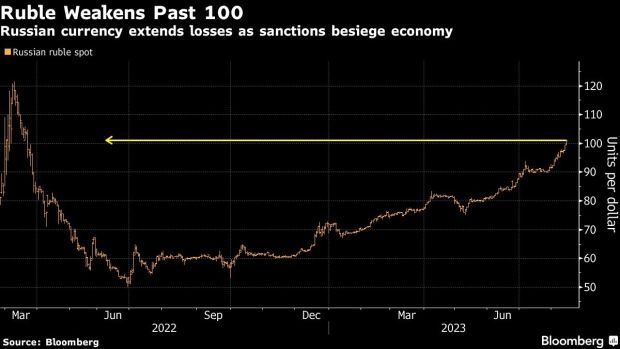New China Contagion Risks Emerge as Threat to Riskier Assets - BNN Bloomberg

Investors in developing countries encountered a multitude of difficulties on Monday, including a shift towards populism in the political choices of Argentine voters, potential debt defaults in China, and an unusual governmental reproach towards the central bank of Russia.
MSCI Inc.'s stock index is hovering close to the lowest level in five weeks, and its currency equivalent is at its lowest since March. This indicates that investors are feeling anxious about the specific risks faced by each country, which, combined with global monetary conditions, may negatively impact the prospects of developing nations. Following an unexpected victory by a populist outsider in the primary elections, Argentine assets are predicted to experience further losses. The country's dollar debt has already seen a decline in emerging markets, and in premarket trades in New York, a US exchange-traded fund focused on Argentine stocks has also fallen.
Javier Milei's initial triumph indicates a refusal of the present political system that has subjected the nation to extended periods of financial difficulties and uncontrollable inflation. The relatively unknown legislator aligns himself with libertarianism and advocates for adopting the use of the US dollar in the economy.
Discover More: Argentina's Dollar Bonds Take a Nosedive After Unforeseen Victory of Populist Candidate
The increasing political uncertainties in Latin America are making the already struggling sentiment even worse due to the slowdown of China's economy. Just when emerging markets were anticipating improvements in financial conditions as the series of interest rate increases comes to an end, the risks of further spreading of the property market crisis in China added to the disappointment brought by last week's underwhelming economic numbers. Moreover, reports revealing the growing number of debt defaults spreading to wealth management sectors have also dampened the mood for traders during the weekend.
Click to Read More: Chinese Shadow Banking Giant Sends Shockwaves Among Investors With Unfulfilled Payments
The Chinese currency, the yuan, experienced a decline to its lowest point in comparison to November. In addition, Chinese stocks suffered significant consecutive losses, the largest seen since April. Russia's ruble also faced a significant drop, reaching a value beyond 100 per dollar. This decline reflects the effect of international sanctions on the Russian economy. On Monday, the impact on the US dollar was minor, but a majority of emerging-market currencies in Asia experienced a slide as the yuan moved closer to its lowest point in 2023.
Find out more: The slide in China’s offshore yuan continues, reaching its lowest point since November.
Trading in the early hours of the European session was mainly influenced by an article from Russia's government-run news agency Tass, which directed its criticisms towards the central bank. These remarks from the Kremlin are quite uncommon in terms of criticizing the bank's policies.
Maxim Oreshkin, an aide to President Vladimir Putin, criticized a lenient monetary policy for the decline of the ruble and emphasized the importance of a robust currency for Russia. This contradicts the central bank's explanation that the ruble's slump is due to deteriorating trade conditions.
Continue Reading: Putin's Chief Advisor Holds Central Bank Accountable for Declining Ruble and Rising Inflation.
The Russian money is currently ranked as the third weakest in comparison to other currencies in emerging markets. However, there are only two currencies, the Turkish lira and Argentine peso, that have been performing even worse due to continuous political turmoil.
Investors paid close attention to Brazilian assets following the release of data indicating that the economy wrapped up the first six months of the year in a more positive state than anticipated. This information is based on the central bank's activity index.
In the meantime, Saudi Arabia was seeking to strengthen its local debt market by releasing Shariah-compliant financial instruments worth nearly 36 billion riyals ($9.6 billion).
(Rephrases with changes in Argentine property transfers, Brazilian economic figures, and significant devaluation of the yuan)

























































